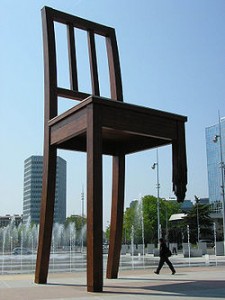
The 2017 intersessional meetings of the Anti-Personnel Mine Ban Convention, or Ottawa Convention, are now underway at the United Nations in Geneva.
The June meeting brings together nearly 300 delegates from more than 70 governments, and 12 international and non-governmental organizations including those representing landmine survivors.
H.E. Thomas Hajnoczi Ambassador of Austria to the UN in Geneva is leading the meeting which will focus on the implementation of mine clearance, stockpile destruction, compliance, assistance to and amongst mine affected countries, and victim assistance actions that the States Parties have agreed to undertake from 2014-2019, with a view of a mine-free world by 2025.
Some of the most mine-affected countries in the world including Afghanistan, Angola, Bosnia and Herzegovina, Cambodia, Colombia and Iraq will be presenting updates of their mine clearance efforts.
This mid-year assessment is also an opportunity for states to prepare for the largest annual gathering of mine action experts and officials, which will take place from 18-22 December at the United Nations in Vienna.
20th Anniversary of the Signing of the Convention
To kick off celebrations of the 20 years since the Convention was adopted and signed, representatives of governments and civil society participated in a symbolic event under the “Broken Chair” in Geneva. The sculpture, a reminder of the many landmine victims, was commissioned by the Swiss branch of Handicap International and placed before the United Nations to encourage states to sign the treaty. Rémy Pagami, Mayor of the City of Geneva, which hosts the Convention’s secretariat, also participated in the event.
Austria, which is currently presiding over the Convention, was among the core group of states that together with civil society championed the idea of a treaty to ban the use, stockpiling, production and transfer of anti-personnel mines, and ensure their destruction. The treaty was also the first instrument to recognize the rights of the victims of the weapon in question. Austria drafted the text that served as the basis for negotiations; one of the authors of the text was the current Chair, Ambassador Hajnoczi, who at the time directed the Austrian Department of Disarmament.
While more than a dozen states including both, mine-affected and traditional donors supported a landmine ban, the core group of states that included Austria, Belgium, Canada, Germany, Norway, South Africa and Switzerland, were instrumental in fostering negotiations and hosting diplomatic conferences that would ultimately lead to the adoption of the Convention in Oslo in September 1997. The Convention opened for signature on 3-4 December in Ottawa later that year. As of 2017, there are 162 States Parties to the Convention representing more than 80% of the world’s countries, and more than 51 million landmines have been destroyed.
For their determination in calling for the Convention, the International Campaign to Ban Landmines, a coalition of non-governmental organizations and its Coordinator, Jody Williams, received the 1997 Nobel Peace Prize.
